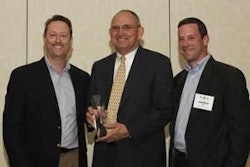Agriculture Secretary Tom Vilsack says he has consistently urged the Environmental Protection Agency to increase the current 10 percent maximum blend for non-flex fuel vehicles and that he is "very confident" that the agency would announce an increase in the near future.
During a recent teleconference, Vilsack told reporters that it remains uncertain which vehicles the new blend rate would apply to and whether it would apply to small engines. "But I think there is a need and a commitment and an understanding that the ... blend rate has to be increased," he added.
Vilsack said there also is work currently underway at USDA "to look further on down the road in terms of what do we need to do as a government, as a nation, as an industry" relative to renewable fuels. "What do we need to do [to] get to 36 billion gallons (the 2007 energy bill mandate for total renewable fuels)?..."
"We want to find out how many refineries we need to build. We need to find out what feed stocks need to be advanced in terms of research and development. We need to figure out how do things more efficiently with our current systems and how we might be able to incentivize those efficiencies. We need to figure out a distribution system and how many pumps, blending pumps are we going to need and where should they be located and how do we get started doing that? What kind of incentives and assistance do we need to provide? And then what do we need to do to encourage Detroit and other automakers to make sure that there's sufficient numbers of vehicles on the road that utilize this renewable fuel."
Asked about current federal biofuel production incentives, Vilsack said, "There's no question that there needs to be a set of incentives. We're obviously waiting for Congress to take the step to extend (the lapsed) biodiesel tax incentive, which needs to be extended to keep that industry going."
And, he added, "There [are] some interesting conversations that could take place about precisely how that [ethanol] blender credit gets utilized and how it needs to be extended, but I think it's important for us to have long-term commitments of whatever incentives or commitments we're going to make. They need to be long term; they can't be one or two years. It's very difficult to get the capital. It's very difficult to get investors interested and people to take the risk associated with this new enterprise without some sort of long-term commitment."
Vilsack declined to provide details regarding administration discussions on future biofuel incentives. "I really don't want to get into a conversation about the policy or the strategy because I think it's somewhat dependent on being able to show folks that there's a plan for long-term expansion and development of this industry, which we don't have," he said. "We need a plan. We need to show that there's a way to get to 36 billion gallons. We need to make sure that there's no skepticism about our capacity to get there, that there are sufficient feed stocks … in the future, that they're going to be enough biorefineries that can be constructed and that there's a real commitment."
Asked about timing of such a plan, Vilsack said, "[M]y hope is that sometime this summer we're going to be able to get to a point where we have consensus not just at USDA but within Department of Energy and EPA on the direction that we think makes sense. And at that point, we're in a position to begin to articulate precisely what policy changes or regulatory changes or incentives or changes, incentives or commitment need to be made in order to make the plan happen."
Asked about criticism from livestock producers who have blamed ethanol for high feed costs, the secretary pointed out the recent increases in corn productivity and the fact that the distillers dried grains that are a byproduct of ethanol can be fed to livestock as mitigating factors. "I think they're appreciative of having the capacity to have that feed supplement," said Vilsack. "So in a sense, if we can convince them that we're going to continue to be productive so the supplies will be there, and if we can continue to provide them this supplement that helps them, and if we continue to expand markets, and open markets that have been closed, then I think some of the concerns will be abated."
It remains unclear when EPA will announce its decision on increasing the permitted ethanol blend. Ethanol industry lobby groups hope it will be yet this month, while House Ag Committee Chairman Collin Peterson said in a recent interview with Informa Economics that he expects the announcement "later this summer." Many observers have speculated that any increase could be limited to cars produced in 2001 onward.

















